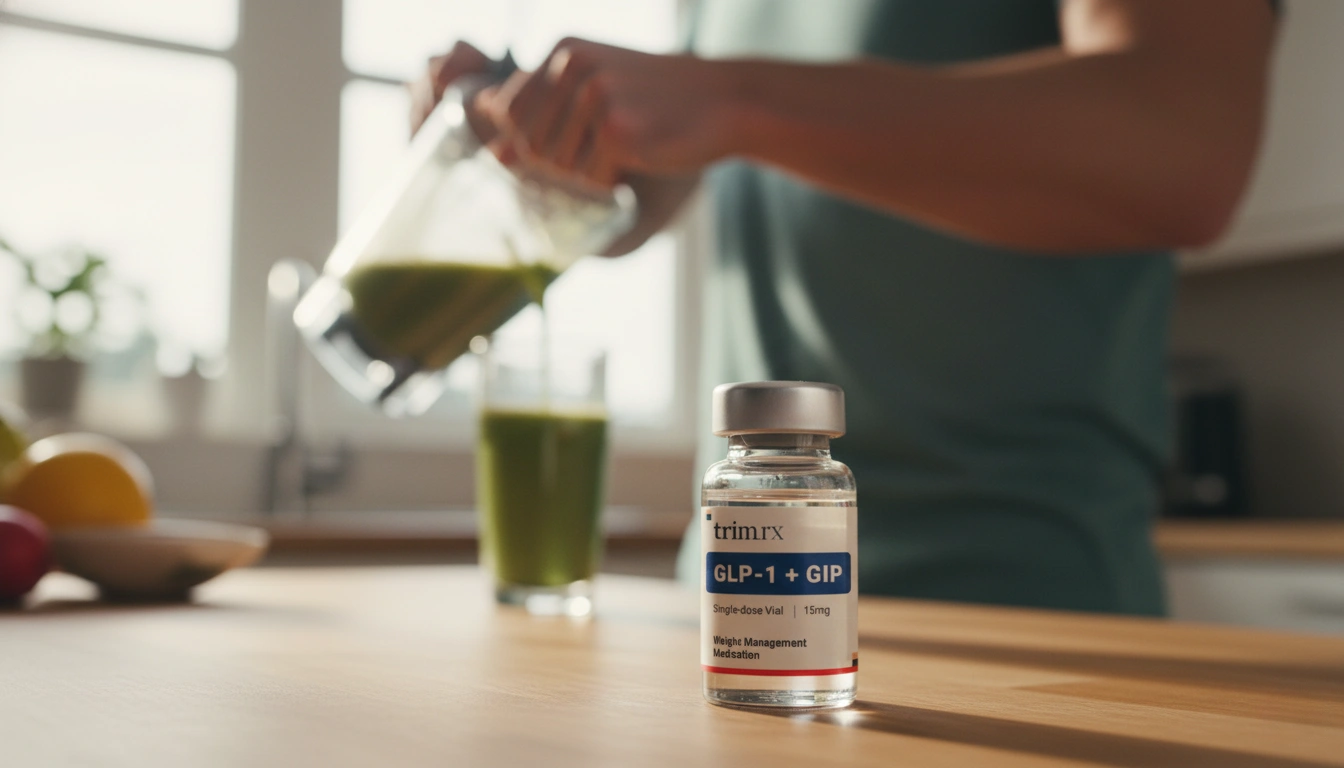Can GLP-1 Cause Pancreatitis? Understanding the Risks and Benefits

Introduction
Did you know that approximately 38.1 million adults in the United States are living with diabetes? This staggering figure highlights the critical need for effective treatment options. As healthcare providers continue to seek innovative solutions, GLP-1 receptor agonists have emerged as a promising class of medications. They not only assist in managing blood sugar levels but also aid in weight reduction, making them appealing for those struggling with obesity.
Nevertheless, the increasing utilization of GLP-1 RAs has sparked discussions regarding their safety, particularly concerning pancreatitis—an inflammation of the pancreas that can lead to severe health complications. Understanding whether GLP-1 medications can cause pancreatitis is essential for anyone considering these treatments, especially those with existing risk factors.
In this post, we will explore the following key areas:
- Overview of GLP-1 Receptor Agonists: What they are, how they work, and their role in managing diabetes and obesity.
- Understanding Pancreatitis: What it is, its causes, symptoms, and potential complications.
- Research Insights: Analyzing current studies on the link between GLP-1 medications and pancreatitis.
- Risk Factors: Identifying who may be at greater risk for developing pancreatitis while on GLP-1 therapy.
- Guidelines for Safe Usage: Recommendations for patients considering GLP-1 medications.
- Conclusion: Summarizing key points and encouraging a partnership in health.
Let’s embark on this informative journey together.
The emergence of glucagon-like peptide-1 receptor agonists (GLP-1 RAs) has revolutionized the management of type 2 diabetes and obesity. These medications, including well-known options like Ozempic® and Wegovy®, have gained significant attention for their effectiveness in improving glycemic control and promoting weight loss. However, a cloud of concern looms over their safety profile, particularly the potential risk of pancreatitis. This raises an important question: can GLP-1 cause pancreatitis?
In this blog post, we will delve into the relationship between GLP-1 medications and pancreatitis, examining both the scientific evidence and the clinical implications for individuals considering these treatments. We’ll explore the history of GLP-1 therapies, current research findings, and guidelines for safe usage. By the end, we aim to clarify the risks and benefits associated with GLP-1 RAs, helping you make informed decisions about your weight loss journey and health.
Overview of GLP-1 Receptor Agonists
GLP-1 receptor agonists are a class of medications designed to mimic the action of the naturally occurring hormone glucagon-like peptide-1. This hormone is released in response to food intake and plays a crucial role in regulating appetite and glucose metabolism. By activating GLP-1 receptors, these medications enhance insulin secretion, reduce glucagon release, slow gastric emptying, and promote a feeling of fullness.
Key GLP-1 Medications
Several GLP-1 receptor agonists are currently available on the market, including:
- Semaglutide (Ozempic® and Wegovy®)
- Liraglutide (Victoza®)
- Dulaglutide (Trulicity®)
- Exenatide (Byetta® and Bydureon®)
- Lixisenatide (Adlyxin®)
These medications have not only demonstrated efficacy in lowering blood sugar levels but also in promoting weight loss, which is particularly beneficial for patients with type 2 diabetes and obesity.
Mechanism of Action
GLP-1 receptor agonists work through multiple mechanisms:
- Increased Insulin Secretion: They stimulate the pancreas to release insulin in response to meals, which helps lower blood glucose levels.
- Decreased Glucagon Secretion: By inhibiting glucagon, which raises blood sugar, these medications further assist in blood glucose control.
- Appetite Suppression: They signal the brain to reduce appetite, leading to decreased food intake and weight loss.
Clinical Benefits
The benefits of GLP-1 medications extend beyond glycemic control. Clinical studies have shown that they are associated with cardiovascular benefits, including reduced risks of heart attack and stroke. Additionally, they can lead to significant weight loss, making them an attractive option for patients struggling with obesity.
Understanding Pancreatitis
Pancreatitis is a serious condition characterized by the inflammation of the pancreas, which can occur in two forms: acute and chronic. Understanding the nature of this condition is vital for assessing the risks associated with GLP-1 therapies.
Causes of Pancreatitis
Several factors can contribute to the development of pancreatitis:
- Gallstones: These can block the pancreatic duct, leading to inflammation.
- Alcohol Consumption: Chronic alcohol use is a well-known risk factor.
- Certain Medications: Some drugs, including certain diabetes medications, have been implicated.
- Genetic Factors: Family history and genetic predispositions can increase the likelihood of developing the condition.
Symptoms of Pancreatitis
Common symptoms of pancreatitis include:
- Severe abdominal pain
- Nausea and vomiting
- Fever
- Increased heart rate
- Swollen abdomen
In cases of acute pancreatitis, symptoms can escalate quickly and may require hospitalization.
Potential Complications
Pancreatitis can lead to serious complications, including:
- Pancreatic Necrosis: Tissue death in the pancreas.
- Infection: The inflamed pancreas may become infected.
- Diabetes: Damage to the pancreas can impair insulin production, leading to diabetes.
- Kidney Failure: Severe cases may result in renal complications.
Given the risks associated with pancreatitis, understanding the potential connection with GLP-1 medications is crucial for patients considering these treatments.
Research Insights
The relationship between GLP-1 receptor agonists and pancreatitis has been a topic of extensive research. While some studies suggest a potential link, others have found no significant association.
Current Findings
- Mixed Results: Earlier studies indicated a possible increased risk of acute pancreatitis among patients using GLP-1 RAs. However, subsequent research has contested these findings, suggesting that the risks may not be as pronounced as initially thought.
- Recent Analysis: A propensity score-matched study involving over 900,000 patients with type 2 diabetes found that the use of GLP-1 RAs did not significantly increase the risk of pancreatitis compared to patients not on these medications. In fact, the lifetime risk of pancreatitis was lower in those taking GLP-1 medications.
- FDA Review: The U.S. Food and Drug Administration (FDA) has acknowledged the potential for pancreatitis with GLP-1 medications but emphasizes that the actual incidence in clinical trials is low and not statistically significant.
Conclusions from Research
The consensus among recent studies is that while there could be a theoretical risk of pancreatitis with GLP-1 medications, the overall evidence does not support a strong causal relationship. This highlights the importance of considering individual patient risk factors when evaluating treatment options.
Risk Factors for Developing Pancreatitis with GLP-1 Use
Understanding who may be more susceptible to pancreatitis while on GLP-1 therapies is essential for personalized care. Here are some key risk factors to consider:
- History of Pancreatitis: Patients with a prior history of pancreatitis may be at increased risk, although recent studies suggest that this should not deter the use of GLP-1 medications.
- Diabetes Type: Individuals with type 2 diabetes may experience different risks compared to those without diabetes.
- Advanced Chronic Kidney Disease: Patients with advanced CKD (Stage III or greater) have been shown to have a higher risk of developing pancreatitis when initiating GLP-1 therapy.
- Tobacco Use: Smoking is another significant risk factor that can elevate the likelihood of pancreatitis.
- Obesity: Interestingly, higher body mass index (BMI) has been found to be protective against pancreatitis in some studies. This suggests that individuals with obesity may have a lower risk when starting GLP-1 RAs.
Considerations for Patients
If you’re considering GLP-1 medications, it’s essential to discuss your complete medical history with your healthcare provider. This conversation should include any prior episodes of pancreatitis, current medications, and lifestyle factors that may influence your risk.
Guidelines for Safe Usage of GLP-1 Medications
To ensure the safe use of GLP-1 receptor agonists, we recommend the following guidelines:
- Comprehensive Assessment: Before starting GLP-1 therapy, complete a thorough health assessment, including a discussion of any past medical history, particularly related to pancreatitis.
- Monitoring: Once on treatment, monitor for any symptoms indicative of pancreatitis, such as severe abdominal pain, nausea, or vomiting. Early recognition can help mitigate risks.
- Educate Yourself: Understand the potential side effects and the importance of reporting any unusual symptoms to your healthcare provider.
- Risk Stratification: If you fall into a higher-risk category (e.g., history of pancreatitis, advanced CKD), your healthcare provider may suggest alternative treatments or closer monitoring.
- Partnership in Health: Work collaboratively with your healthcare team to find the best therapeutic approach tailored to your needs.
Conclusion
As we navigate the complexities of GLP-1 receptor agonists and their association with pancreatitis, it becomes clear that while concerns exist, the current body of evidence does not support a significant risk for most patients. These medications offer substantial benefits in managing diabetes and facilitating weight loss, making them valuable tools in the healthcare arsenal.
By understanding the mechanisms of GLP-1 RAs, recognizing the signs of pancreatitis, and adhering to safety guidelines, we can approach weight loss and diabetes management with confidence and care. At TrimRx, we are dedicated to providing personalized, medically supervised weight loss solutions that prioritize your health and well-being.
If you’re interested in exploring GLP-1 medications as part of your weight loss journey, we encourage you to take our free assessment quiz to determine your eligibility for personalized weight loss programs. Together, we can work towards achieving your health goals in a safe and effective manner.
FAQ
What are GLP-1 receptor agonists?
GLP-1 receptor agonists are medications that mimic the action of the hormone glucagon-like peptide-1, helping to regulate blood sugar levels and promote weight loss.
Can GLP-1 medications cause pancreatitis?
While there have been concerns about the potential link between GLP-1 medications and pancreatitis, recent studies indicate that the risk is low for most patients.
Who is at higher risk for pancreatitis while on GLP-1 medications?
Individuals with a prior history of pancreatitis, advanced chronic kidney disease, and tobacco users may have an increased risk.
What should I do if I experience symptoms of pancreatitis while on GLP-1 therapy?
Seek immediate medical attention if you experience severe abdominal pain, nausea, or vomiting. Early intervention is crucial.
How can I learn more about GLP-1 medications and determine my eligibility?
You can take our free assessment quiz to explore personalized weight loss solutions and determine if GLP-1 medications may be right for you.
By understanding the benefits and risks associated with GLP-1 medications, we empower ourselves to make informed decisions that prioritize our health and wellness.

Transforming Lives, One Step at a Time
Keep reading
China’s Supreme Court Upholds Semaglutide Patent for Novo Nordisk
China’s Supreme People’s Court upholds Novo Nordisk’s semaglutide compound patent, supporting IP protection.
Over 600,000 Californians Risk Losing Access to GLP-1 Weight-Loss Drugs
California’s Medi-Cal will stop covering GLP-1 weight-loss drugs for weight-loss-only prescriptions, effective Jan. 1, 2026.
Weight-Loss Pill Approval Likely to Prompt Overhaul of Packaged Food and Fast-Food Products
FDA approval of GLP-1 weight-loss pills may prompt food makers and restaurants to shift to high-protein, smaller-portion products.



